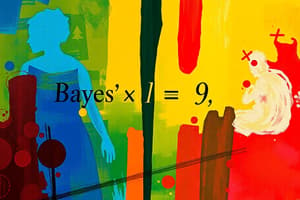Podcast
Questions and Answers
What is another name for Bayes' theorem?
What is another name for Bayes' theorem?
- Probability principle
- Bayes' law (correct)
- Thomas' rule
- Reverend's law
How does Bayes' theorem allow for more accurate risk assessment?
How does Bayes' theorem allow for more accurate risk assessment?
- By assuming the individual is typical of the population as a whole
- By conditioning the risk relative to specific conditions rather than assuming the individual is typical of the population (correct)
- By ignoring the individual's age and focusing on general population data
- By considering only the individual's age and ignoring other factors
What did Thomas Bayes use to provide an algorithm for calculating limits on an unknown parameter?
What did Thomas Bayes use to provide an algorithm for calculating limits on an unknown parameter?
- Linear regression
- Conditional probability (correct)
- Exponential growth
- Geometric progression
What is one of the many applications of Bayes' theorem?
What is one of the many applications of Bayes' theorem?
What does Bayesian inference express according to the text?
What does Bayesian inference express according to the text?
What type of conic section is a circle considered as?
What type of conic section is a circle considered as?
In analytic geometry, how may a conic be defined?
In analytic geometry, how may a conic be defined?
What property defines a non-circular conic?
What property defines a non-circular conic?
How are the three types of conic sections described in the Euclidean plane?
How are the three types of conic sections described in the Euclidean plane?
What determines the type of conic in terms of its eccentricity?
What determines the type of conic in terms of its eccentricity?
Flashcards are hidden until you start studying
Study Notes
Bayes' Theorem
- Bayes' theorem is also known as the Bayes' rule or Bayes' law.
- It allows for more accurate risk assessment by updating the probability of an event based on new information or evidence.
- Thomas Bayes used inverse probability to provide an algorithm for calculating limits on an unknown parameter.
- One of the many applications of Bayes' theorem is in machine learning and artificial intelligence.
Bayesian Inference
- Bayesian inference expresses the probability of a hypothesis being true given certain data or evidence.
Conic Sections
- A circle is considered an ellipse with an eccentricity of 0, which is a type of conic section.
- In analytic geometry, a conic can be defined as a set of points that satisfy a quadratic equation in two variables.
- A non-circular conic is defined by its eccentricity, which is a measure of its elongation.
- The three types of conic sections in the Euclidean plane are described as: parabola (eccentricity = 1), ellipse (eccentricity < 1), and hyperbola (eccentricity > 1).
- The type of conic is determined by its eccentricity, with higher values indicating more elongated shapes.
Studying That Suits You
Use AI to generate personalized quizzes and flashcards to suit your learning preferences.




